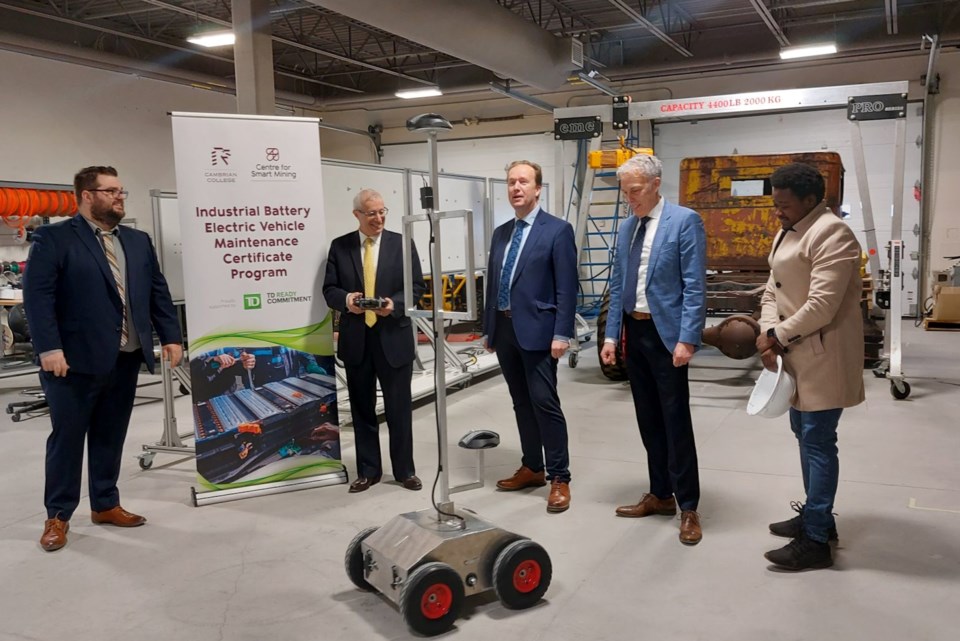There’s a window of opportunity for Ontario to be part of the electrical vehicle revolution, said Vic Fedeli, the province’s economic development minister, and Ontario needs to move fast to secure its global position.
Battery electric vehicles (BEVs) and Northern Ontario’s place in the global transition to clean energy technologies took up much of Fedeli’s speech before a Greater Sudbury Chamber of Commerce crowd on Feb. 6.
“We think the window is only open for a short period of time,” said Fedeli, as BEV and international battery manufacturers are looking for safe and secure places to park their capital investment dollars today.
In his travels as Ontario’s lead salesman, Fedeli said many multi-national executives widely regard this province as a “sea of calm” in being a stable and safe jurisdiction and a reliable business partner in a very turbulent world.
The Nipissing MPP believes Northern Ontario will be the “sleeper story of 2023 ” in stepping up to supply the mineral raw materials needed to support the $16 billion in investments made by the automotive sector in Ontario over the last 24 months, “with much, much more to come.”
“This the first time in 120 years,” he said, “that Northern Ontario is part of the auto sector. I think this is our year to shine that announcements will be made throughout the North.”
He called critical minerals like nickel, copper, lithium and graphite the new currency in a global “arms race” as international demand for these metals increases and only stands to surge in the years ahead.
Creating a homegrown BEV supply chain from mines to manufacturing plants is an economic priority for the Ford government.
Places like Sudbury are at the “pointy end of the spear,” Fedeli said, in the coming electric vehicle boom. With its rich nickel deposits, the city is at the “epicentre” of the green energy transition, he said, not just in mineral extraction and processing, but with the related innovation happening in the city, especially with smart mobility solutions.
Fedeli said he came away impressed from his tour, earlier in the day, of Cambrian College’s Centre for Smart Mining and its applied research capabilities in the area of industrial electric vehicles for the mining industry.
He was offered a peek at the proposed 5,600-square-foot BEV Lab under construction at the Glencore Centre for Innovation on the campus, a lab facility that will be the first of its kind in Canada, if not North America.
Across the North, Fedeli predicts there will be significant news flow this year in the growth of nickel projects and advanced stage lithium projects in northwestern Ontario. He added that he wouldn’t be surprised to hear of a formal announcement of a lithium processing plant to be constructed either in the northwest or Sudbury.
The latter is an indirect reference to Frontier Lithium of Sudbury and its PAK lithium project near the Manitoba border.
The next generation of mines to feed the world’s critical minerals demand will be in remote places like the Ring of Fire in the James Bay region.
Fedeli expects it will be a “spectacular project” due to its vast mineral potential. Backing the development, he said, is a fully committed Premier Doug Ford who’s prepared to put $1 billion into the mine-related infrastructure.
“Everybody wants to get this going. I think we’ll hear great things about the Ring of Fire and I really believe communities like Sudbury are going to shine.”
Later in an interview, Fedeli did acknowledge issues remain with the federal and provincial regulatory processes that are not aligned and move at a glacial pace to put new mines into production.
Battery plants in southern Ontario can be built in two years, but bringing new mines into production in Northern Ontario to feed those plants can take five to 10 years, or more. Lagging government environmental reviews, slow permitting approval times, and the lack of proper consultation with impacted Indigenous communities remain chronic issues of concern.
One attendee in the crowd, an environmental engineer, mentioned that the regulatory regime in Ontario is the “most restrictive” he’s seen in 20 years and poses major hurdles to growth. Environment Ministry turnaround times to open a file and review projects have increased from 20 days last year to more than 100 days this year. He asked Fedeli if the government will continue with its efforts to streamline the environmental review process.
Fedeli said in an interview that Ontario is fortunate to have new Mines Minister George Pirie, a former mining executive, on that file and that he’s keenly aware of the importance of mining those minerals and having them processed in the North.
“I know he’s doing everything that he can to make the development times quicker.”
Fedeli expressed confidence that Ontario will have the mineral pipeline in place to supply the car factories with battery-grade materials.
“We have it in the ground. We need to get it out of the ground and into batteries.”
While the transformation in Ontario’s automotive sector is still in the early stages, Fedeli said the situation is evolving at an “accelerated pace” with more companies set to make investment announcements.
“I expect that pace to accelerate. We’ve got to keep up to it.”
Fedeli said the premier has made it clear, “I want my team working at the speed of business, and that’s why we were able to land $16 billion worth of new auto business for Ontario.”




